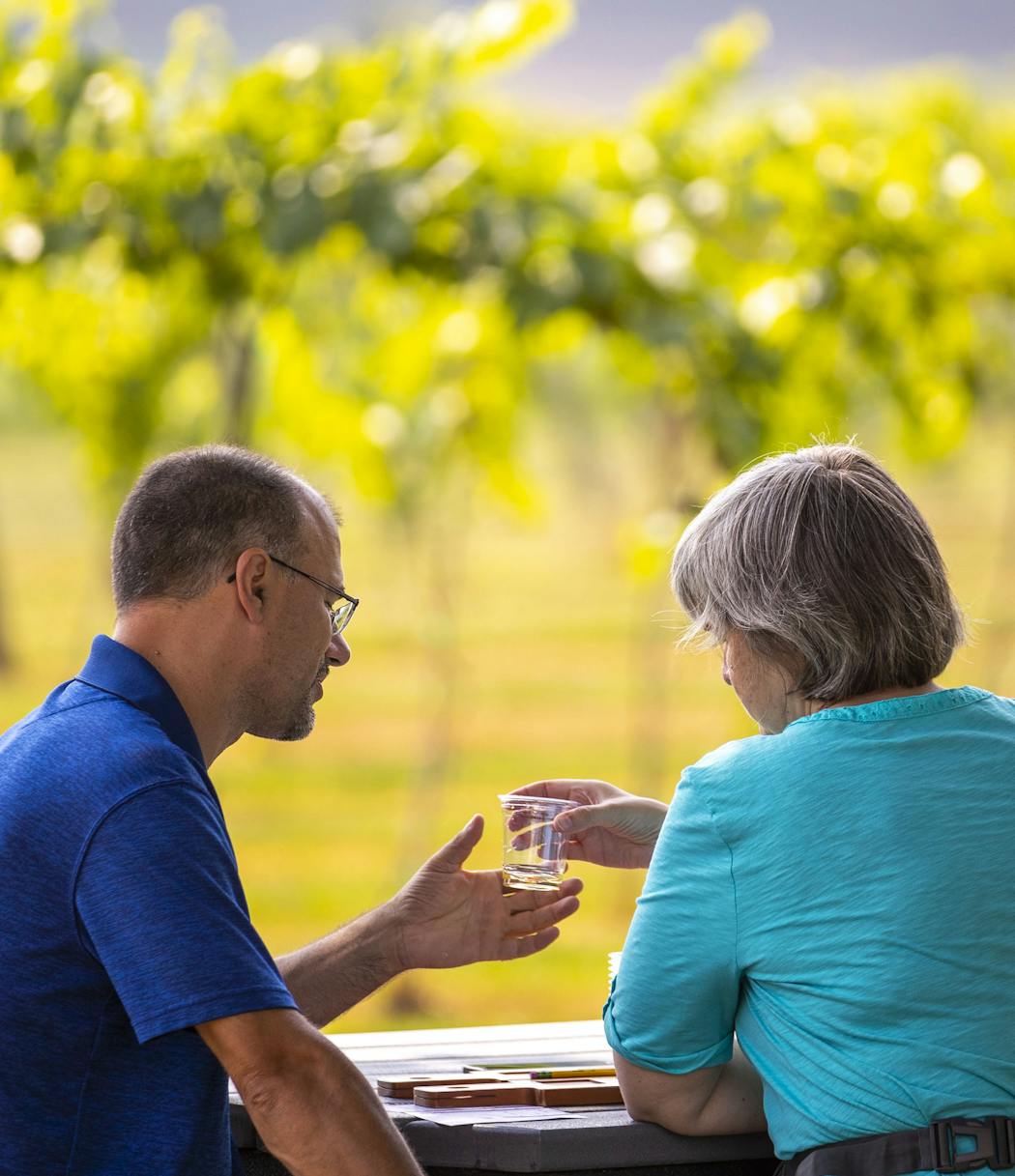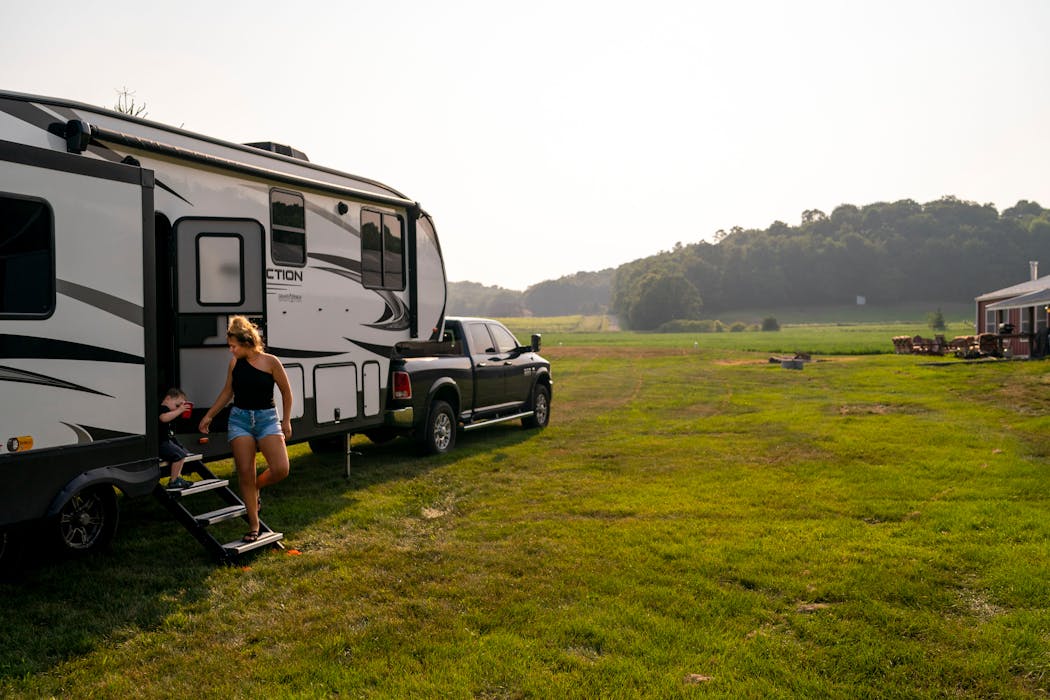Living in Colorado Springs with a backyard view of Pikes Peak, Julia and Bobby Gillis aren't easily wowed by spectacular scenery. But they were impressed as they drove through rural western Wisconsin at that time on a summer's evening when everything in the outdoors looks like it was outlined with a white highlighter.
"We've never been to this part of the country before, and we like meandering the back roads," said Bobby. "When you're on a highway, it all looks the same. I'm all about the journey."
The destination for the couple and their three children was Forestville Vines, a vineyard between River Falls and Ellsworth, complete with a winery in a restored one-room schoolhouse that was built in 1897.
After parking their fifth-wheel trailer on the property, the family strolled across a meadow to settle in on the tasting room patio, sipping their beverages and munching on pizza as the sun slipped lower.
"After a day on the road, this is so much nicer than a campground, when you're around all the other RVers," said Julia. "I'm thinking how beautiful it will be in the morning when I drink my coffee."
The Gillises were able to camp at this unusual destination through a membership club for RV owners. Harvest Hosts offers stays at 2,550 camping locations, 47 of them in Minnesota, all off-the-beaten-path attractions like wineries, breweries, farms, botanical gardens, museums and golf courses.
Members pay $99 a year, or $139 for a golf membership, for unlimited access to the sites. The camping itself is free, but money does change hands.
"Belonging to Harvest Hosts is intentionally cheap," said CEO Joel Holland. "There's a social contract embedded in what we're doing. The expectation is that guests will make a purchase at the places where they're staying. Every time they book, we remind them to spend at least $20; the average is $50. Our hosts need to benefit from the arrangement."
A technology entrepreneur, Holland sold his company, and he and his wife spent a year crisscrossing the country in their RV. After growing weary of the sameness of discount store parking lots and public or park campgrounds, the couple discovered Harvest Hosts and immediately valued the concept. Holland bought the company from its founder in 2018.
At that time, it had 6,000 members. Today, there are 200,000 — and counting. Holland said a thousand new RVers join every week.
Earlier this year, Harvest Hosts raised $37 million from a New York-based private equity investor to expand its scope. The company recently added several more recruiters to seek additional partner sites.
"Any small business with something to sell and room to park an RV or two could be a host," Holland said. "People were falling in love with the RV lifestyle before COVID, and that's put it in overdrive. Once you have an RV, you have to find interesting experiences for using it. Harvest Hosts fills that void."
Sharing the passion
During the pandemic, interest in recreational vehicles saw an unprecedented surge, sought out by Americans wary of air travel and staying in hotels. An RV Industry Association study found that 46 million Americans planned to hit the road in owned or rented RVs over the next 12 months.
Those who visit Harvest Hosts sites must be so-called boondockers. Because the attractions are not traditional campgrounds, travelers will find no shower houses or connections to water, sewer or power, making the stops available only to self-contained campers who don't need such hookups for an overnight stay.
That describes Nancy and Tom Houlton. The St. Paul couple have parked their 25-foot motor home at "more than a half-dozen, less than a dozen" Harvest Hosts sites over the past year when they twice traveled to Oregon to visit their daughter.
"We love it. We stay at small, family-owned places we would never see otherwise. My husband's favorite place was where we parked by a creek and then picked blackberries that grew right there," said Nancy.
She has found interacting with the people who own or run the host sites to be an unexpected pleasure.
"We've had these marvelous beer and wine tasting experiences where someone shares their passion for what they make and where they live," she said. "We were at one place that had been a family farm for a hundred years; this 75-year-old man told us his growing up story, about their history harvesting maple syrup. I'll never forget it."
Alpacas and ax throwing
In Minnesota, the Harvest Hosts sites are scattered across the state.
RVers who are animal lovers can park their rigs next to the barn at Red Gate Alpaca Farm, which sits on 65 acres along the Cannon River in Dundas, near Northfield.
That's where Kraig Quamme tends his herd of 70 alpacas. His creatures often are mistaken for llamas, but alpacas are half the size and, in Quamme's estimation, "cuter and nicer."
"We're not a petting zoo, we're a working farm. We offer a tour through the barn and halter up some of our friendly, social alpacas so they can interact with them and hand feed them," Quamme said. "Some people offer to clean pens. They want to do this."
A recruiter for Harvest Hosts reached out to Quamme to bring his farm into the network. While campers have purchased mittens, socks, sweaters and yard spun from alpaca fiber and even bought compost from the barn, which Quamme extols as "the best available for gardeners," he's not sure he can call the experiment an unqualified success.
"With the time we spend, it's not a moneymaking operation," he said. "Our hope is that it generates interest in our industry. Someone visiting might fall in love with alpacas like I did and become a future alpaca owner."
But Harvest Hosts visitors are making a difference at Next Chapter Winery in New Prague. Manager Jackie Brockaway has welcomed a number of RVers who are not traveling across the country, but rather making a short drive from their homes in the Twin Cities.
"They meet friends here, enjoy time on our patio or tasting room, and the friends go home and they stay all night," she said. "They spend their money and buy bottles to go, and they also get the word-of-mouth going on their blogs and social media accounts. The exposure is huge."
Most Harvest Hosts sites can accommodate between one and three RVs at a time, but there's space for more than a dozen at Champion Valley, a Lakeville adventure park that offers paintball, archery tag and ax throwing.
"This used to be a tree farm, and so it's gorgeous. We've got 150 acres, with ponds and lots of wildlife," said CEO Matt Ames. "We've been surprisingly busy with Harvest Hosts. We're looking for new ways to attract visitors, and the campers who've stayed with us have had a blast."
Adding interest
Harvest Hosts allows its members to stay for only one night at its member sites, so the Gillis family had less than 24 hours to take in the glories of western Wisconsin before continuing to a weeklong vacation on Michigan's Upper Peninsula.
"Last night we were at a Harvest Hosts spot at a Nebraska orchard. On the way back, we've booked a night at a dairy farm in Iowa," said Bobby. "They say we'll get a hands-on tour; the kids will love that."
The couple purchased their camper last year after the pandemic forced them to cancel a two-week trip to Ireland. Although they consider themselves camping novices, they've quickly gotten hooked on the experience and plan to continue to seek out Harvest Hosts locations to add interest to their travels.
"At first we were making the best of it, but now we love it. We slowed down in the past year, and we're more connected as a family. We're off our phones and out in nature," said Julia. "We had talked about RVing when we retired, but I'm glad we're doing it now."
Kevyn Burger is a Minneapolis-based freelance writer and broadcaster.

The 5 best things our food writers ate this week

A Minnesota field guide to snow shovels: Which one's best?

Summer Camp Guide: Find your best ones here

Lowertown St. Paul losing another restaurant as Dark Horse announces closing




